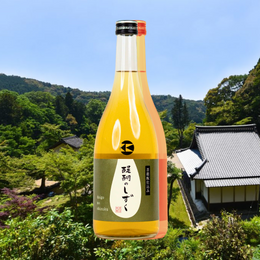
Moments of discovering the unusual, the complex, the downright transformative, are precisely what make drinks and spirits appreciation so enjoyable. Terada Honke is one of the most prominent sake makers that have opened a door to a whole new way of appreciating the sake category for drinkers around the world.
This 350-year-old brewery is regarded as one of, if not the finest, maker of “natural sake” by connoisseurs, including the legendary Copenhagen restaurant, Noma.

The late Terada Keisuke is credited for reinventing the brewery in the 1980s.

The long legacy isn't its claim to fame. Instead, it was the brewery's turning-point in the 1980s when Terada Keisuke, the 23rd-generation owner, fell seriously ill with gastroenteritis one day. Laying in bed, Keisuke’s rumination led him to a guilty thought that he had been doing a lot of “rotten” things in his sake business. He felt that he did not genuinely put his heart into the sake business; placing money before quality, using the cheapest rice and cheapest methods of sake-make just like every other average brewery was doing.
By cutting corners and adding distilled alcohol, they were making an inferior and less healthful product. Keisuke's gastric illness, he believed, was somehow a karmic payback for cutting corners in the sake business.
So he returned from his sickbed to radically reinvent his brewery with processes that were closer to nature. Lab cultured yeast was replaced with more effort-intensive wild fermentation processes such as the kimoto or bodaimoto methods. Organic rice was used, and very minimal rice polishing was done so that the grains retained most of their rustic, natural flavour. They also ended the practice of adding distilled alcohol, focusing entirely on Junmai-grade sakes.

Terada Honke is presently stewarded by its 24th-generation custodian, Terada Masaru– a 40-plus-year-old with the lithe build and vigour of a much younger man. Masaru came into the picture when he married his wife, Satomi in 2003, taking on both her surname and the ancient brewery from her lineage.
Terada Honke's guiding philosophy is woven around a respect for traditional methods, a relentless pursuit of quality, and an unwavering commitment to embracing challenges. In a world where sake production is often driven by efficiency and predictability, they stand in bold defiance of convention.
Relying purely on natural fermentation (instead of starter yeast cultures), combined with the labour-intensive kimoto method, each batch is a unique journey, beginning with a blank slate and capturing the wild yeasts and bacteria that fill the brewery's air. To some, this is the ultimate expression of terroir – sake that reflects the natural microbial fingerprint of the place where it was born.

The traditional Kimoto method of brewing sake dates back several hundred years, and involves brewers pounding the rice mixture rhythmically to introduce natural lactic acid bacteria. They sometimes sing brewing songs much like how Scottish sailors would sing sea shanties.
We're tasting the 2023 batch of the Terada Honke Gonin Musume Shizen No Manma. This is the most approachable edition from the series.
"Shizen no Manma" translates to "in its natural state", while "Gonin Musume" translates to "Five daughters" - a reference to the pivotal 23rd generation owner's five daughters.

Terada Honke Gonin Musume Shizen No Manma, 16.5% ABV – Review
Junmai Kimoto Muroka Nama Genshu, brewed in 2023 with Miyama Nishiki rice with 70% rice polishing ratio.

Tasting notes
Nose: A burst of clean, bright yeastiness hits me first – grassy and vibrant, almost like a high-quality agricole or mezcal. But there's sweetness too: caramel, light honeydew notes and a touch of sweet grapefruit, plus a definite hint of cream and vanilla.
Palate: This is intensely flavourful, and remarkably balanced considering the complexity. A robust freshness cuts through the rich vanilla cream notes, and it develops an incredible depth that's hard to describe. There's definitely a hint of meatiness that adds an unusual savouriness similar to parma ham and mild cheese.
Finish: It dries out at the end, leaving me with a lingering flavour of steamed Korean rice cakes, warm rice pudding, maybe even clotted cream. That vanilla note is still there, along with a subtle rustic earthiness.

My thoughts:
I have to say, this sake is seriously impressive. Take a sip of this and you'll realise it's life-changing stuff. A complete rethinking of what sake can be.
The complexity and sheer amount of flavour are remarkable. That light meatiness is a fascinating counterpoint to the creamy sweetness. That rice pudding note is simply delightful, and even though some of the other Terada Honke expressions lean towards intense saltiness, this one's the most approachable of the bunch.
My Rating: 9/10

@CharsiuCharlie







